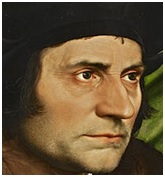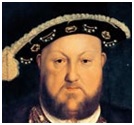|
 |
|
 |
Thomas More - Philosophy and Ethics
Thomas More (1477-1535)
English philosopher (pictured right), lawyer and chief minister of Henry VIII, who eventually executed him for refusing to approve his divorce of Catherine of Aragon. His Dutch philosopher friend, Erasmus (pictured below), called him “a man for all
seasons” which became the title for the 1960’s play and film about More.
His most famous book is... Utopia (1516).
What did he say about ethics and leadership?
1. Conscience and principle More: a) died for his principles He was executed because of his moral opposition to
b) practised his Christian principles (of love, honesty, humility and fairness). More:
Erasmus described his soul as “more pure than any snow”.
2. Purpose and God Always do what God wants. This is why More lived in a monastery for years, whilst he was training to be a lawyer. He never discarded the monastic habits of:
Despite his busy job, every day he got up at 2 a.m., and studied and prayed until 7 a.m.! His last words were “I die the king’s good servant and God’s first”. 3. “Utopia” In his imaginary, ideal state of Utopia:
4. Love and friendship More:
5. Leadership He failed as a leader and politician, because he couldn’t stop Henry’s divorce and break with the Roman Catholic Church. Why?
a) too much reflection, not enough action More prayed and studied a lot, but didn’t give enough attention to his policies. b) intolerant of other people’s views He was:
c) dogmatic and not pragmatic He wasn’t prepared to adapt his principles and policies to changing circumstances.
d) over-respect for authority and tradition This made him unwilling to:
Key quote on God and religion I die the king’s good servant and God’s first.
Key quote on death This hath not offended the king (More’s last words, moving his beard away from the execution block). Key quote on ethics The clearness of my conscience has made my heart hop for joy(in a letter to his daughter, Margaret, from the Tower of London, 1534).
Key quote on management You must not abandon the ship in a storm because you cannot control the winds….What you cannot turn to good, you must at least make as little bad as you can.
Key quote on decision making I think that if any good thing shall go forward, something must be adventured.
Key quote on peace of mind In the things of the soul, knowledge without remembrance profits little.
Key quote on stress and pain We cannot go to heaven in featherbeds (on suffering).
Key quote on education and training Education is not the piling on of learning, information, data, facts, skills or abilities – that’s training or instruction – but is rather make visible what is hidden as a seed.
|
|
|
||
|
|
|
||
|
||
| Copyright © wisdomtowin.com All Rights Reserved | ||
|










